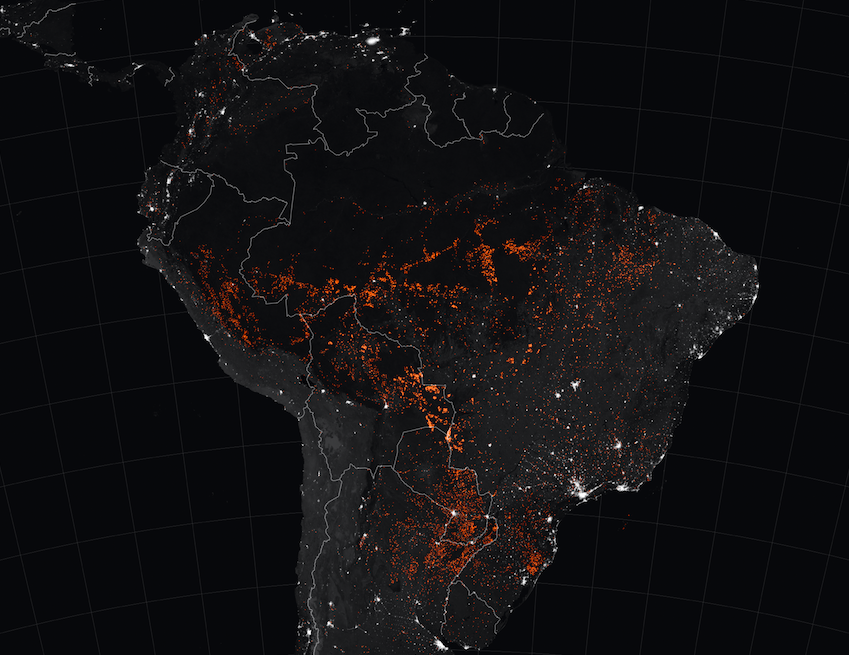
A man-made crisis is raging across one of the most important and biodiverse regions of the planet. The Amazon is burning, and due to the fact that tropical rainforests never burn naturally, the blame falls entirely on us—or, more precisely, on our demand for commodities that require land. Until global companies rethink how they manage their supply chains in Brazil, we can expect more Amazon fires in the future.
The crisis is similar to what took place back in 2015 in Indonesia. That year, an extremely strong El Niño cycle sparked historically bad fires in Indonesia, which charred 2.5 million hectares of land, created as much daily carbon emissions as the United States, and sickened millions due to dangerous haze across Southeast Asia. Then, the focus turned to the role of the palm oil and paper pulp industry, which for years had drained wetlands and cut down tropical forests, thereby contributing to the conditions that led to the fires.
In Brazil, it’s not palm oil or paper pulp, but soy and cattle that are at the center of deforestation and illegal burning in the Amazon. But there is one similarity with Indonesia: Global supply chains connect consumers and businesses in the United States, Canada and Europe with the devastation that is taking place on the ground in Brazil. Since far-right President Jair Bolsonaro took office in Brazil last year and declared the Amazon “open for business,” deforestation has risen rapidly.
“Now that the world is finally paying attention, it's important to also understand that governments and companies around the world are emboldening Bolsonaro's toxic policies when they enter trade agreements with his government or invest in agribusiness companies operating in the Amazon,” said Moira Birss, finance campaign director for the nonprofit Amazon Watch, in a press statement.
Amazon Watch has named BlackRock, the world’s largest investment firm, as a leading investor in Brazilian agribusiness. Other companies connected to illegal deforestation are Cargill, recently named the worst company in the world by the nonprofit Mighty Earth, as well as other agribusiness companies such as Archer Daniels Midland and Bunge.
There are undoubtedly more, but open information and supply chain monitoring is nearly non-existent in this area. There’s no effective transparency mechanism in the soy or cattle industries, meaning that it is difficult for outside observers to effectively trace if any product was grown in a recently cut-down forest. Even the Amazon Soy Moratorium, in which companies voluntarily agreed not to source soy from the Amazon, has been criticized as greenwashing.
“The fires in the Amazon are the result of complicated political, financial and social factors," said Henriette Walz, deforestation lead for the Rainforest Alliance, in a press statement. "We need continued collaborative effort from governments, companies and consumers to send a message.”
Indigenous people—whose land is being stolen and often burned illegally—are not standing for this anymore. A group has launched a call to boycott all companies that invade their land. While their initial focus will be on Brazilian companies directly doing illegal activities or setting fires, anyone along the entire supply chain could be fair game for a boycott. Quite simply stated, ignorance is no longer an option in 2019. The planet is literally burning, and any company that sources any products from tropical forests regions is partly to blame.
We understand the fires, and where they are burning, partly due to the massive improvement in satellite monitoring technology. Companies can—and should—know exactly where the soy, beef, palm oil, or paper pulp they use comes from, and end business relationships promptly with anyone doing any illegal activities.
While the fires might make one feel hopeless for the future of the planet, concerted action can make a difference. Remember Indonesia? It has made remarkable progress since 2015 and while fires are also burning there, it appears 2019 will end on a much better note than four years ago.
Brazil, too, could protect the Amazon, put an end to fires, and ensure the health of our planet well into the future. But with a climate denying, pro-development president at its head, it is clear that global pressure will be key – and that means holding any company, big or small, accountable for its role in enabling the destruction of the Amazon.
Image credit: NASA

Nithin Coca is a freelance journalist who focuses on environmental, social, and economic issues around the world, with specific expertise in Southeast Asia.














